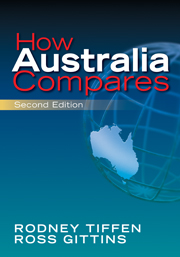Book contents
- Frontmatter
- Contents
- List of tables and figures
- Preface to the second edition
- Acknowledgements
- Reading the tables
- Abbreviations
- Introduction
- 1 People
- 2 Government and politics
- 3 Economics
- 4 Work and labour
- 5 Government taxes and spending
- 6 Health
- 7 Education
- 8 Inequality and social welfare
- 9 International relations
- 10 Environment
- 11 Science and technology
- 12 Telecommunications and computing
- 13 Media
- 14 Family
- 15 Lifestyles and consumption
- 16 Crime and social problems
- 17 The search for scoreboards
- 18 The Howard impact
- Sources and references
10 - Environment
Published online by Cambridge University Press: 05 June 2012
- Frontmatter
- Contents
- List of tables and figures
- Preface to the second edition
- Acknowledgements
- Reading the tables
- Abbreviations
- Introduction
- 1 People
- 2 Government and politics
- 3 Economics
- 4 Work and labour
- 5 Government taxes and spending
- 6 Health
- 7 Education
- 8 Inequality and social welfare
- 9 International relations
- 10 Environment
- 11 Science and technology
- 12 Telecommunications and computing
- 13 Media
- 14 Family
- 15 Lifestyles and consumption
- 16 Crime and social problems
- 17 The search for scoreboards
- 18 The Howard impact
- Sources and references
Summary
Biodiversity
Environmental issues do not always lend themselves to a comparative, quantitative summary. Every country has its own natural endowments and problems bestowed by its geographical setting. Sometimes comparative measures are merely charting these different geographic-cum-economic inheritances rather than any meaningful difference in environmental performance. Similarly, many environmental problems are primarily local – the effluent produced by a neighbourhood factory; the problems of water flow and salinity in the Murray-Darling Basin; or the destruction of a particular urban heritage in the name of development. National summary measures cannot capture this local impact.
Tables 10.1 to 10.3 give a crude measure of countries' biodiversity simply by measuring the types of animals found in each. Counting species as if they are all of the same value, like a unit of currency, obviously fails to capture key dimensions of bio-diversity. However, the tables do show great differences among the selected countries.
Australia is one of 17 ‘mega-diverse’ countries, whose ecosystems have exceptional variety and uniqueness. Of the selected countries, only the United States is also recognised in this way. The tables give testimony to this rich bio-diversity. The United States and Australia are the top two countries in all three tables, having far more mammals, birds and reptiles than any of the others. (The very large numbers are because zoologists distinguish many different types where most lay observers would see far fewer.
- Type
- Chapter
- Information
- How Australia Compares , pp. 152 - 163Publisher: Cambridge University PressPrint publication year: 2009



